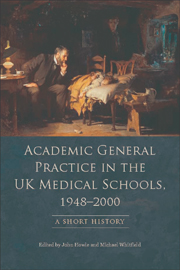Book contents
- Frontmatter
- Contents
- Preface
- Acknowledgements
- Abbreviations
- Timeline
- Introduction
- Dedication
- 1 The University of Aberdeen
- 2 The University of Dundee
- 3 The University of Edinburgh
- 4 The University of Glasgow
- 5 The Cardiff University School of Medicine
- 6 Academic General Practice in Ireland
- 7 The University of Birmingham
- 8 The University of Bristol
- 9 The University of Cambridge
- 10 The University of Exeter
- 11 The University of Leeds
- 12 The University of Leicester
- 13 The University of Liverpool
- 14 The University of Manchester
- 15 The University of Newcastle
- 16 The University of Nottingham
- 17 The University of Oxford
- 18 The University of Sheffield
- 19 The University of Southampton
- 20 The London Medical Schools
- 21 The University of St Andrews
- Appendix 1 Primary Care in the New Medical Schools
- Appendix 2 The SIFT/ACT Negotiations
- Appendix 3 An Overview
- Appendix 4 And Finally…
- Index
Appendix 2 - The SIFT/ACT Negotiations
Published online by Cambridge University Press: 05 August 2013
- Frontmatter
- Contents
- Preface
- Acknowledgements
- Abbreviations
- Timeline
- Introduction
- Dedication
- 1 The University of Aberdeen
- 2 The University of Dundee
- 3 The University of Edinburgh
- 4 The University of Glasgow
- 5 The Cardiff University School of Medicine
- 6 Academic General Practice in Ireland
- 7 The University of Birmingham
- 8 The University of Bristol
- 9 The University of Cambridge
- 10 The University of Exeter
- 11 The University of Leeds
- 12 The University of Leicester
- 13 The University of Liverpool
- 14 The University of Manchester
- 15 The University of Newcastle
- 16 The University of Nottingham
- 17 The University of Oxford
- 18 The University of Sheffield
- 19 The University of Southampton
- 20 The London Medical Schools
- 21 The University of St Andrews
- Appendix 1 Primary Care in the New Medical Schools
- Appendix 2 The SIFT/ACT Negotiations
- Appendix 3 An Overview
- Appendix 4 And Finally…
- Index
Summary
The aims and constitution of the original AUTGP were drafted to promote the academic development of the discipline. The intention was that there should not be any significant element of ‘trade union’ activity, but the problems consequent on the totally insufficient funding of the early departments by their universities and medical schools surfaced regularly at the early executive committee meetings.
Across the NHS generally, the Department of Health was attempting to find a more explicit and more equitable formula for distributing its resources. This led in 1974 to the publication of the Resource Allocation Working Party (RAWP) Report, identifying historical differences between the total costs of running ‘teaching’ and ‘non-teaching’ hospitals. These differences were rationalised as being due to the ‘service costs of teaching’ (SIFT) and put back into the subsequent funding formula on a ‘per clinical student per year’ basis. From the outset these funds were payable only to hospitals. General-practice-based teaching was excluded, and so began our campaign for the provision of an analogous subsidy to meet the extra costs of supporting academic costs in the clinical setting of general practice. In 1974 the sum identified as needed to support hospital-based academic work was around £8,000 per student per year – a sum which had grown to nearly £40,000 per year (nearly £5 billion for the NHS nationally) by the time that first teaching practices (1990) and then departments of general practice (1992) won a share of NHS support funding.
- Type
- Chapter
- Information
- Academic General Practice in the UK Medical Schools, 1948-2000A Short History, pp. 131 - 134Publisher: Edinburgh University PressPrint publication year: 2011



